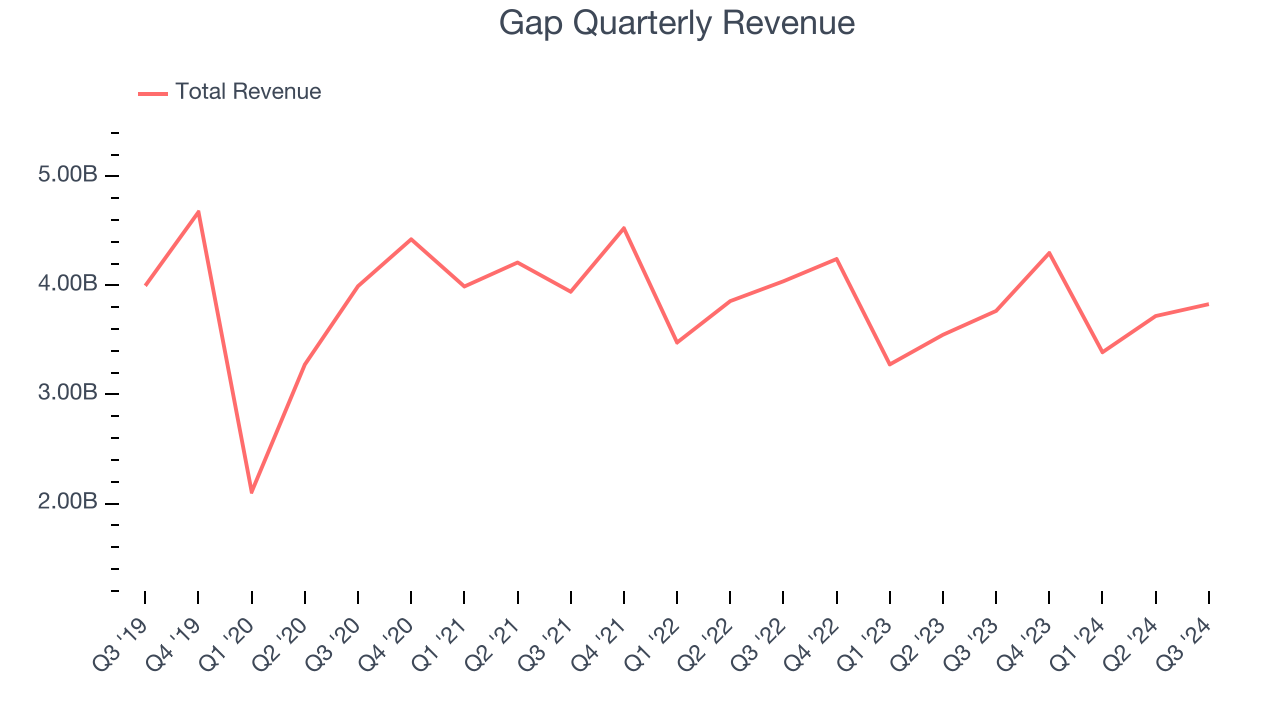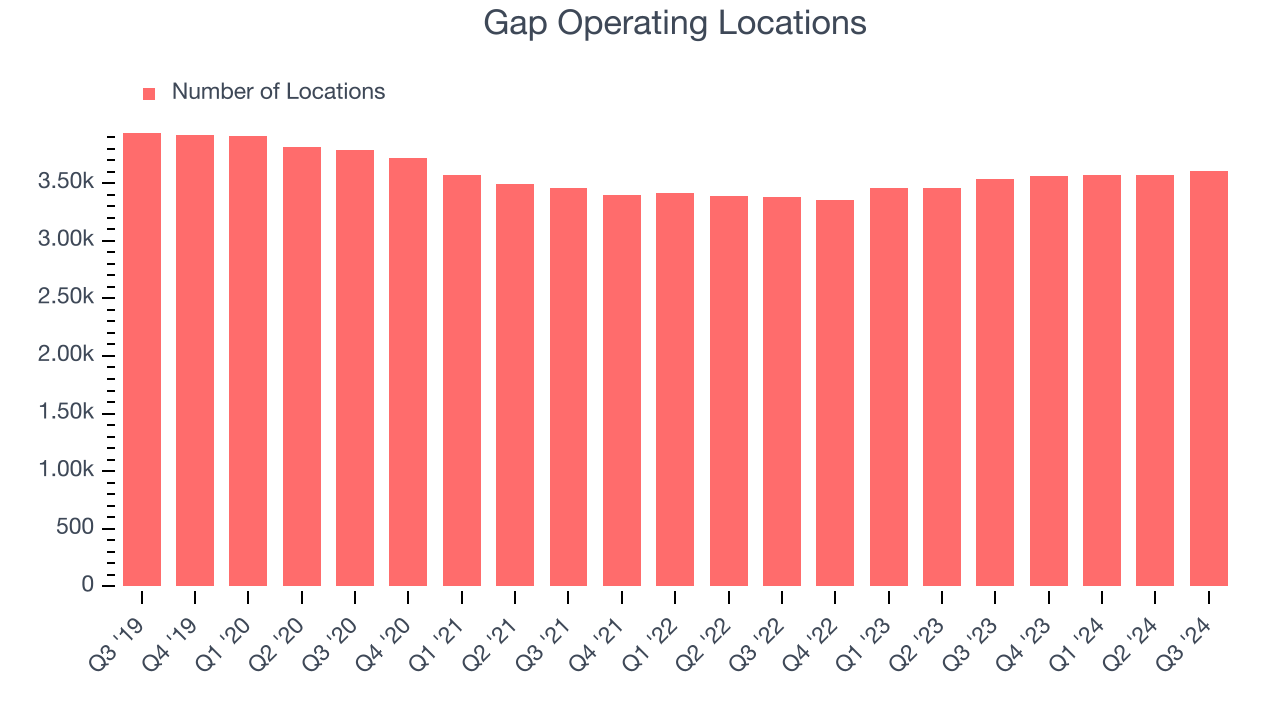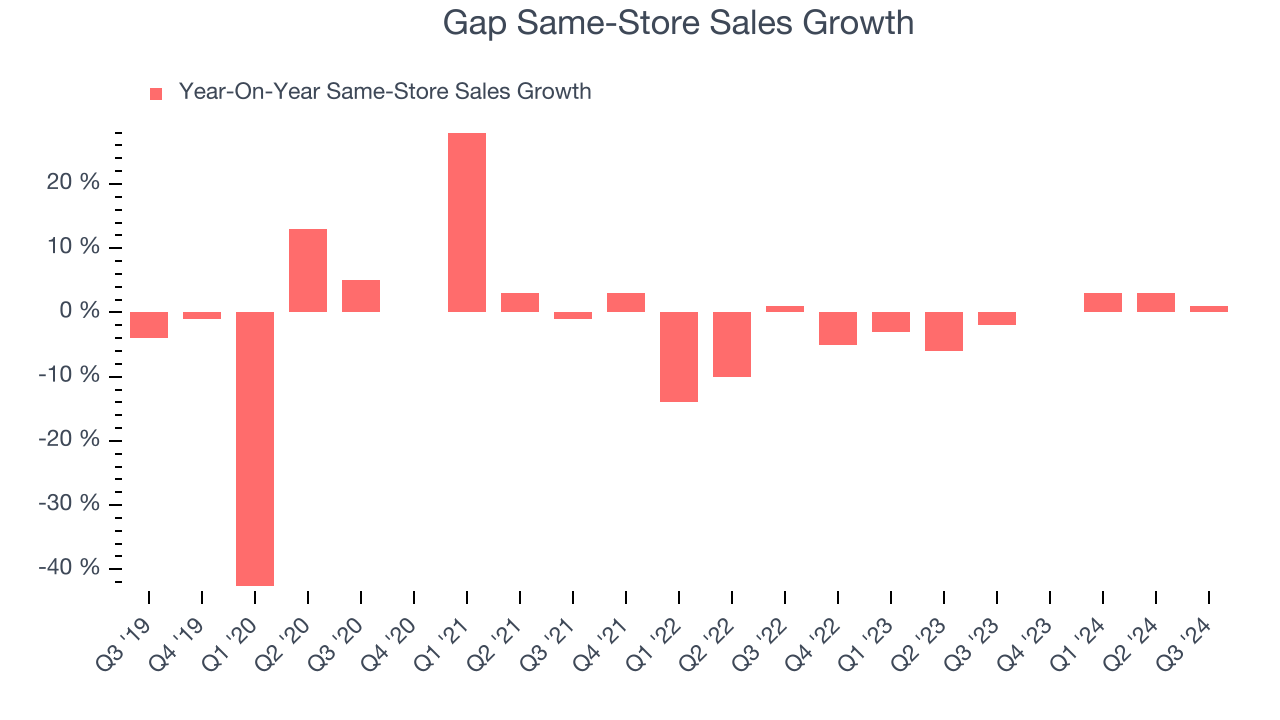Clothing and accessories retailer Gap (NYSE:GAP) announced better-than-expected revenue in Q3 CY2024, with sales up 1.6% year on year to $3.83 billion. Its GAAP profit of $0.72 per share was 23.6% above analysts’ consensus estimates.
Is now the time to buy Gap? Find out by accessing our full research report, it’s free.
Gap (GAP) Q3 CY2024 Highlights:
- Revenue: $3.83 billion vs analyst estimates of $3.81 billion (1.6% year-on-year growth, 0.6% beat)
- Adjusted EPS: $0.72 vs analyst estimates of $0.58 (23.6% beat)
- Adjusted EBITDA: $479 million vs analyst estimates of $427.6 million (12.5% margin, 12% beat)
- Operating Margin: 9.3%, up from 6.6% in the same quarter last year
- Free Cash Flow Margin: 3.7%, down from 5.7% in the same quarter last year
- Locations: 3,603 at quarter end, up from 3,533 in the same quarter last year
- Same-Store Sales rose 1% year on year (-2% in the same quarter last year)
- Market Capitalization: $7.76 billion
"I'm proud that Gap Inc. delivered another successful quarter, growing net sales for the 4th consecutive quarter and gaining market share across all brands while meaningfully expanding operating margin," said President and Chief Executive Officer, Richard Dickson.
Company Overview
Operating under the Gap, Old Navy, Banana Republic, and Athleta brands, Gap (NYSE:GAP) is an apparel and accessories retailer selling casual clothing to men, women, and children.
Apparel Retailer
Apparel sales are not driven so much by personal needs but by seasons, trends, and innovation, and over the last few decades, the category has shifted meaningfully online. Retailers that once only had brick-and-mortar stores are responding with omnichannel presences. The online shopping experience continues to improve and retail foot traffic in places like shopping malls continues to stall, so the evolution of clothing sellers marches on.
Sales Growth
Examining a company’s long-term performance can provide clues about its quality. Any business can put up a good quarter or two, but the best consistently grow over the long haul.
Gap is one of the larger companies in the consumer retail industry and benefits from a well-known brand that influences consumer purchasing decisions. However, its scale is a double-edged sword because it's harder to find incremental growth when you've penetrated most of the market.
As you can see below, Gap’s demand was weak over the last five years (we compare to 2019 to normalize for COVID-19 impacts). Its sales fell by 1.4% annually despite opening new stores. This implies its underperformance was driven by lower sales at existing, established locations.

This quarter, Gap reported modest year-on-year revenue growth of 1.6% but beat Wall Street’s estimates by 0.6%.
Looking ahead, sell-side analysts expect revenue to remain flat over the next 12 months. This projection doesn't excite us and implies its newer products will not lead to better top-line performance yet.
Here at StockStory, we certainly understand the potential of thematic investing. Diverse winners from Microsoft (MSFT) to Alphabet (GOOG), Coca-Cola (KO) to Monster Beverage (MNST) could all have been identified as promising growth stories with a megatrend driving the growth. So, in that spirit, we’ve identified a relatively under-the-radar profitable growth stock benefitting from the rise of AI, available to you FREE via this link.
Store Performance
Number of Stores
The number of stores a retailer operates is a critical driver of how quickly company-level sales can grow.
Gap operated 3,603 locations in the latest quarter. It has opened new stores quickly over the last two years and averaged 2.6% annual growth, faster than the broader consumer retail sector.
When a retailer opens new stores, it usually means it’s investing for growth because demand is greater than supply, especially in areas where consumers may not have a store within reasonable driving distance.

Same-Store Sales
A company's store base only paints one part of the picture. When demand is high, it makes sense to open more. But when demand is low, it’s prudent to close some locations and use the money in other ways. Same-store sales provides a deeper understanding of this issue because it measures organic growth at shops open for at least a year.
Gap’s demand has been shrinking over the last two years as its same-store sales have averaged 1.1% annual declines. This performance is concerning - it shows Gap artificially boosts its revenue by building new stores. We’d like to see a company’s same-store sales rise before it takes on the costly, capital-intensive endeavor of expanding its store base.

In the latest quarter, Gap’s same-store sales rose 1% year on year. This growth was a well-appreciated turnaround from its historical levels, showing the business is regaining momentum.
Key Takeaways from Gap’s Q3 Results
We were impressed by how significantly Gap blew past analysts’ EBITDA expectations this quarter. We were also glad its EPS outperformed Wall Street’s estimates. Zooming out, we think this quarter featured some important positives. The stock traded up 13.8% to $25.10 immediately after reporting.
Indeed, Gap had a rock-solid quarterly earnings result, but is this stock a good investment here? If you’re making that decision, you should consider the bigger picture of valuation, business qualities, as well as the latest earnings. We cover that in our actionable full research report which you can read here, it’s free.
